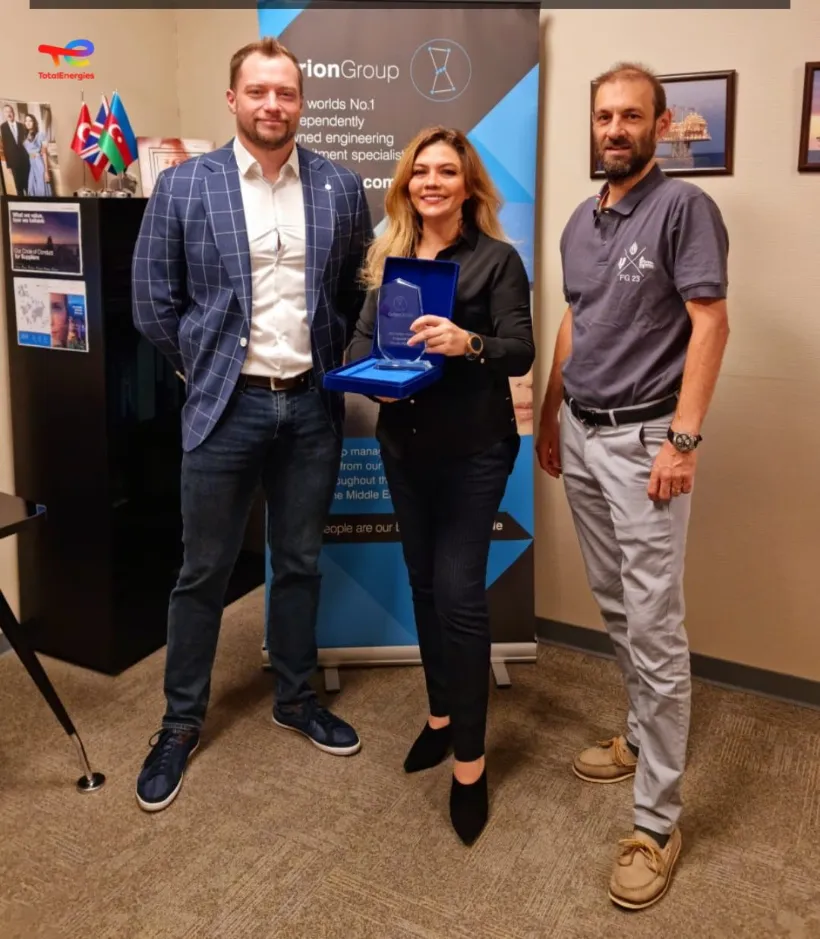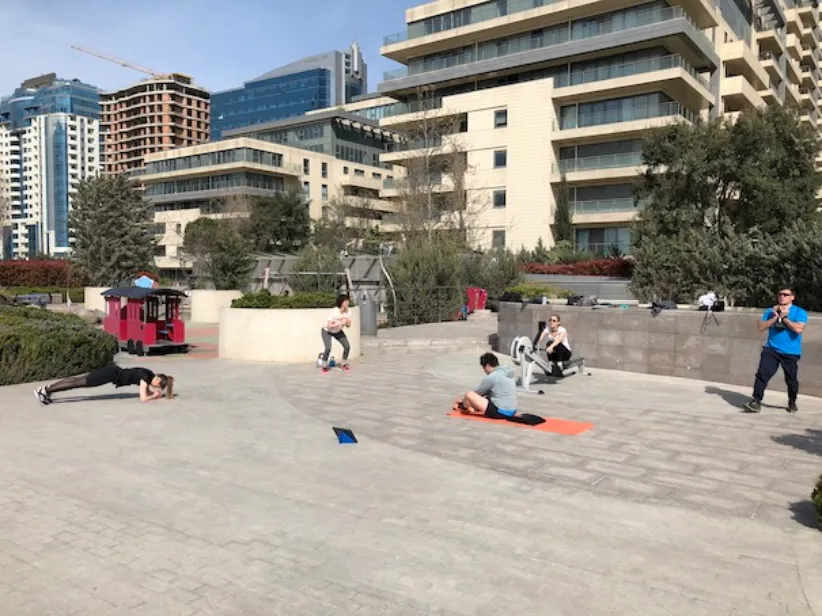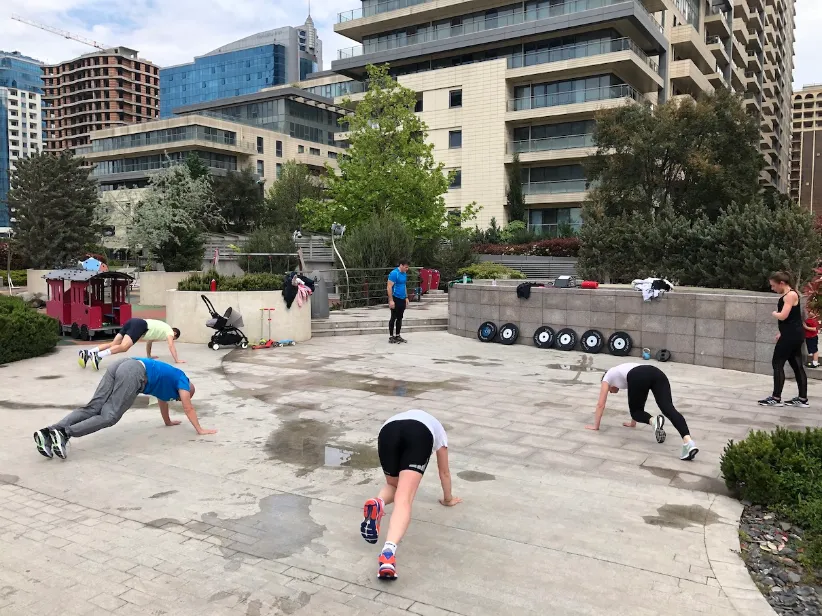
Orion Group are delighted to announce our annual Health and Safety Award has been presented to Nicolas Martiny.
“It is exercise alone that supports the spirits and keeps the mind in vigour.”
Marcus Tullius Cicero

Orion Group’s country Manager, Zamina Clemmey was delighted to present the award.
Zamina commented, “All of us working here in Orion’s Baku office are thrilled to provide our ‘Health and Safety’ award, which goes to Nicolas Martiny. Nicolas stood up during a very difficult time to provide fabulous support and guidance to his colleagues. We are delighted to recognise his fabulous contributions to the wellbeing of colleagues".
Nicolas is HSE Lead working for us at TotalEnergies in Baku, Azerbaijan and his winning submission was titled “Maintaining Wellness”

The link between physical activity and positive mental health is indisputable. During the period of Covid and lockdown, Nicolas recognised the potential that inactivity could have on his fellow colleagues, and he immediately took decisive action. Nicolas bought and rented a variety of sports equipment to maintain a social link between people in accordance with covid restrictions and local legislation. Nicholas provided “CrossFit” training schedules, advice, support and assistance for his colleagues working on the project in Baku. The motivating goal was for people to become “fitter” – both mentally and physically. These activities were hugely appreciated by his colleagues and really helped them stay connected as they supported each other during a difficult period.

Andy Christie, Group BMS Director commented "“Very many congratulations to Nicolas in achieving our Safety Award with his facilitation and promotion of wellbeing in the workplace which is such a key aspect in our overall physical and mental health”
Are you looking to enter our annual Health and Safety award competition, you must be a current contractor with Orion Group and working in the field of health and safety. We welcome applications from October to December, with awards taking place during February. There is a cash prize for the winning entry! - To enter, send your application to andy.christie@orioneng.com
Some useful advice below on making changes to your daily routine to promote better mental health and wellbeing:
Daily physical activity
For adults, physical activity can include recreational or leisure-time physical activity, transportation (e.g. walking or cycling), occupational activity (i.e. work), household chores, play, games, sports, or planned exercise in the context of daily, family, and community activities.
Everyday things such as walking to the bus stop, carrying bags or climbing stairs all count, and can add up to the 150 minutes of exercise a week recommended for the average adult.
Exercise
A purposeful activity carried out to improve health or fitness, such as jogging, cycling or lifting weights to increase strength.
Play
Unstructured activity that is done for fun or enjoyment.
Sport
Structured and competitive activities that include anything from football or squash to cricket. We can play these as part of a team or even on our own. This can be a fun and interactive way of getting exercise that doesn’t have to feel like exercising.
These activities can vary in intensity and include high-intensity activities, such as tennis, athletics, swimming, and keep-fit classes. They can be lower-intensity activities and sports, such as snooker or darts. Making exercise fun rather than something you have to do can motivate keeping it up.
What is wellbeing?
The government defines wellbeing as ‘a positive physical, social and mental state’. For our purposes, we are focusing on mental wellbeing.
Mental wellbeing does not have a single universal definition, but it does encompass factors such as:
•The sense of feeling good about ourselves and being able to function well individually or in relationships
•The ability to deal with the ups and downs of life, such as coping with challenges and making the most of opportunities
•The feeling of connection to our community and surroundings
•Having control and freedom over our lives
•Having a sense of purpose and feeling valued
Of course, mental well-being does not mean being happy all the time, and it does not mean that you won’t experience negative or painful emotions, such as grief, loss, or failure, which are a part of normal life. However, whatever your age, being physically active can help you to lead a mentally healthier life and can improve your well-being.
What impact does physical activity have on wellbeing?
Physical activity has a huge potential to enhance our well-being. Even a short burst of 10 minutes of brisk walking increases our mental alertness, energy and positive mood.
Participation in regular physical activity can increase our self-esteem and can reduce stress and anxiety. It also plays a role in preventing the development of mental health problems and in improving the quality of life of people experiencing mental health problems.
Enhance our mood
Physical activity has been shown to have a positive impact on our mood.
A study asked people to rate their mood immediately after periods of physical activity (e.g. going for a walk or doing housework), and periods of inactivity (e.g. reading a book or watching television).
Researchers found that the participants felt more content, more awake and calmer after being physically active compared to after periods of inactivity. They also found that the effect of physical activity on mood was greatest when the mood was initially low. Many studies look at the physical activity at different intensity levels and its impact on people’s mood. Overall, research has found that low-intensity aerobic exercise – for 30–35 minutes, 3–5 days a week, for 10–12 weeks – was best at increasing positive moods (e.g. enthusiasm, alertness).
Reduce stress
When events make us feel threatened or upset our balance in some way, our body’s defences cut in and create a stress response, which may make us feel a variety of uncomfortable physical symptoms and make us behave differently. We may also experience emotions more intensely.
The most common physical signs of stress include sleeping problems, sweating, and loss of appetite. Symptoms like these are triggered by a rush of stress hormones in our body – otherwise known as the ‘fight or flight’ response. These hormones, adrenaline and noradrenaline, raise our blood pressure, increase our heart rate and increase the rate at which we perspire, preparing our body for emergency response. They can also reduce blood flow to our skin and can reduce our stomach activity. At the same time, cortisol, another stress hormone, releases fat and sugar into the system to boost our energy.
Physical exercise can be very effective in relieving stress. Research on employed adults has found that highly active individuals tend to have lower stress rates than less active individuals.
Impact on our self-esteem
Exercise not only has a positive impact on our physical health but can also increase our self-esteem. Self-esteem is how we feel about ourselves and how we perceive our self-worth. It is a key indicator of our mental well-being and our ability to cope with life stressors. Physical activity has been shown to positively influence our self-esteem and self-worth. This relationship has been found in children, adolescents, young adults, adults and older people, and among both males and females.
Dementia and cognitive decline in older people
Improvements in healthcare have led to an increasing life expectancy and a growing population of people over 65 years. Alongside this increase in life expectancy, there has been an increase in the number of people living with dementia and in people with cognitive decline. The main symptom of dementia is memory loss, a progressive disease that results in people becoming more impaired over time. The decline in cognitive functions, such as attention and concentration, also occurs in older people, including those who do not develop dementia. Physical activity has been identified as a protective factor in studies that examined risk factors for dementia. For people who have already developed the disease, physical activity can help to delay further decline in functioning. Studies show that there is approximately a 20% to 30% lower risk of depression and dementia for adults participating in daily physical activity. Physical activity also seems to reduce the likelihood of experiencing cognitive decline in people who do not have dementia.
Impact on depression and anxiety
Physical activity can be an alternative treatment for depression. It can be used as a standalone or combined with medication and/ or psychological therapy. It has few side effects and does not have the stigma that some people perceive to be attached to taking antidepressants or attending psychotherapy and counselling. Physical activity can reduce anxiety levels in people with mild symptoms and may also help treat clinical anxiety. Physical activity is available to all, has few costs attached, and is an empowering approach that can support self-management. Read more about how physical activity can help increase well-being and prevent or manage mental health problems, and get more information about how exercise can improve your mental health.
How much physical activity should I do?
We know all too well that many people do not meet the current physical activity guidelines.
Experts recommend adults should aim to be active daily and complete 2.5 hours of moderate intensity activity over a week – the equivalent of 30 minutes five times a week. It may sound like a lot, but it isn’t as daunting as it first appears.
Where do I start?
Once you have decided to be more physically active, there are a few points worth considering. Apart from improving your physical and mental wellbeing, what else do you want to get from being active?
Ask yourself whether you’d prefer being indoors or out, doing a group or individual activity, or trying a new sport. If sporty exercises put you off or feel uninspired at the thought of limiting yourself to just one single activity. Think outside the box and remember that going on a walk, doing housework, and gardening are all physical activities. Also, would you rather go it alone or do an activity with a friend? Social support can be a great motivator, and sharing your experiences, goals, and achievements will help you to keep focus and enthusiasm.
Overcoming barriers
It can be daunting making changes to your life, and most people get anxious about trying new things. Common barriers, such as cost, injury or illness, lack of energy, fear of failure, or the weather, can hinder getting started; however, practical, and emotional support from friends, family, and experts really helps.
People who are anxious about how their body will look to others while they are exercising may avoid exercise as a result. For women, attending a female-only exercise class or a ladies-only swimming session may help to overcome anxiety as a barrier to initially starting to exercise.
Exercising with a companion can also help to reduce anxiety about how your body looks to others and may be particularly helpful during the first few exercise sessions. The environment can also influence how you feel; gyms with mirrored walls tend to heighten anxiety, as does exercising near a window or other space where you might feel ‘on show’.
Make time
What time do you have available for exercise? You may need to alter commitments to make room for extra activities or choose something that fits into your existing schedule.
Be practical
Ask yourself if you need support from friends and family to complete your chosen activities, or is there a chance your active lifestyle will affect others in your life? Find out how much it will cost and, if necessary, what you can do to make it affordable.
What is right for you?
What kind of activity would suit you best? Think about what parts of your body you want to exercise and whether you’d prefer to be active at home or whether you fancy a change of scenery and would prefer to exercise in a different environment, indoors or outdoors
Make exercise a part of everyday life
Adoption of a more active lifestyle can be as simple as performing everyday tasks with more energy or making small changes to your routine.
Start slow
If physical activity for you is new, gradually build up your ability. At first focus on task goals, such as improving skills or stamina, rather than competition, and keep a record of your activity and review it to provide feedback on your progress.
Goals
Set goals to measure progress might motivate you. Try using a pedometer or a free app on your smartphone to measure your speed and distance travelled, add on an extra stomach crunch, or swim an extra length at the end of each session.
Committing to regular physical activity is an achievement, and every activity session can improve your mood.
At home
There are many activities you can do without leaving your front door, and also involves minimal cost. It can be as simple as doing chores with extra vigour, speeding up the housework, or doing exercises from Youtube at home.
At work
Whether you’re on your feet, sitting at a desk or sitting behind the wheel during working hours, there are many ways you can become more active. Try walking or cycling a slightly longer route home, or using your lunch hour to take a brisk walk, exercise class, or swim. The change of scenery will do you the Wolrd of good.
Out and about
Being out-doors is great for boosting your activity levels. Research suggests that doing physical activity in an outdoor, ‘green’ environment has greater positive effects on wellbeing than indoors.
Further ideas for starting or keeping up with physical activity
•The NHS Choices website has a number of tools to help people get started with physical activity, including exercises for older people, strength and flexibility videos, advice on taking up new sports, and advice on getting started with walking.
•The Great Outdoor Gym Company Outdoor gyms are gyms where some gym equipment is provided in outside spaces for people to use for free.
•The British Heart Foundation’s ‘Health at Work’ website provides further suggestions and some resources to get started with promoting physical activity at work.
For more information on this subject, follow the links:
https://www.helpguide.org/articles/healthy-living/the-mental-health-benefits-of-exercise.htm

